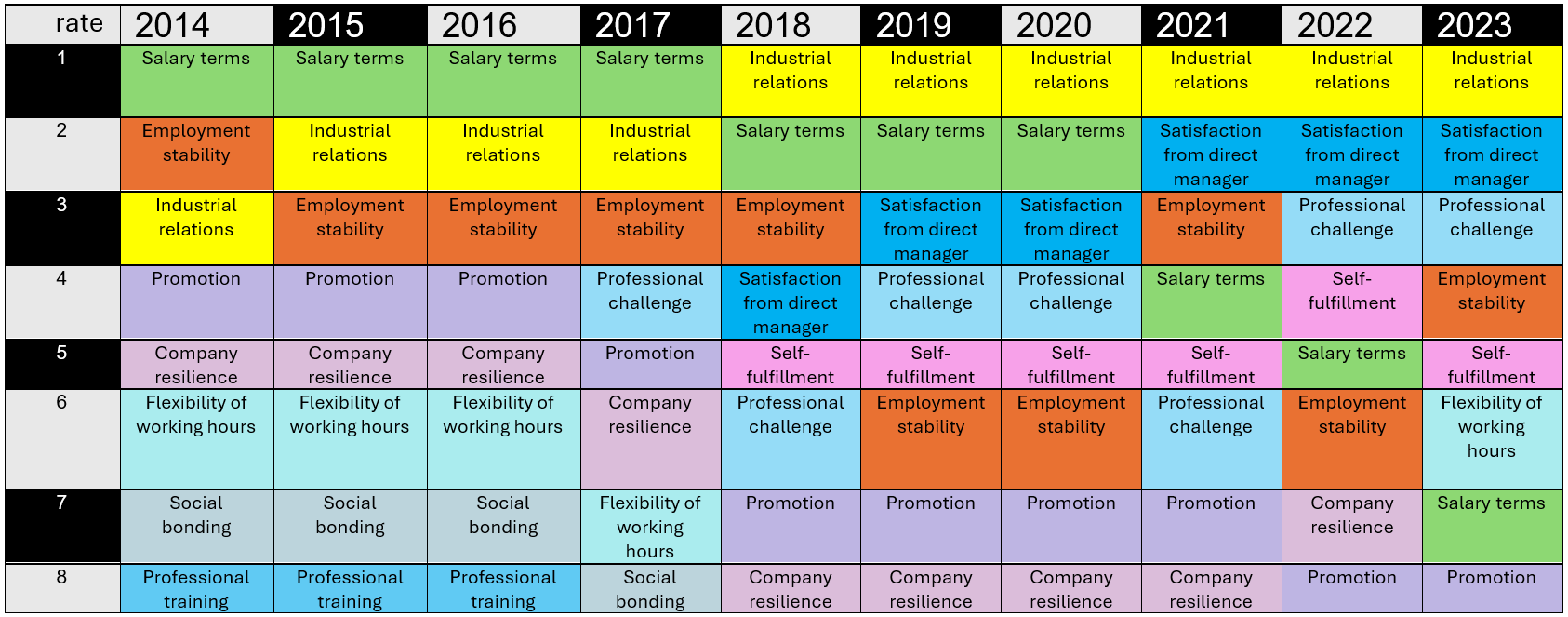Links to previous articles regarding maintaining employees and industrial relations, can be found at the end of the article.
Why do employees leave their jobs?
In one of the trainings sessions, I recently conducted for leading improvement teams, Tamir, one of the trainees, said that in his opinion, employees don’t leave the jobs, they leave their managers. In other words, they left their jobs because of their direct managers. “That is the main reason employees leave or stay on in the job”, he claimed.
Tamir’s opinion is reinforced by an annual survey conducted by CofaceBD in coordination with The Marker Magazine in recent years.
The table below presents employees’ rating of the most important factors at work.

The table shows that the factors “satisfaction from direct manager” and “Industrial relations” have gradually become more prominent over recent years.
So why do managers leave?
Why do CEOs and senior managers leave their jobs?
Unsurprisingly, CEOs and senior managers leave work for the same reasons all other employees do. Primarily because they have problematic relations with their direct managers, usually the company’s owners or the chairmen of the board of directors.
The second reason CEOs leave work is because of an unfulfilled promotion aspiration to become part of the managing board or because they have been offered better positions elsewhere. Another reason may be changes in the company. Successful CEOs who manage the same company for a long-time gain power and control. It gives them satisfaction and a sense of value. When a company is sold or a new board is appointed, CEOs expect changes that will inevitably occur under the new management and affect their power and status in the company. They might be worried about personality clashes, of new terms of employment and other changes. These situations lead to managers seeking new jobs.
I once met a CEO who left his job because of recurring power conflicts within the company. His replacement, a young, vigorous CEO, took over but left the company three months later for the same reasons.
Relationships between CEOs and the board of directors can be complicated. Sometimes CEOs are more powerful than the chairman of the board and manage the company under no control. See article.
Prevention
There is not much that can be done when a CEO decides to leave the company and, in some cases, it might even be an opportunity to revitalize the company.
However, there are ways to prevent managers and professional employees from leaving the firm.
The best way is to act in advance, not to wait for a crisis.
It is important to engage the employees in the company goals and objectives. The same goes for managers who need to feel that they and the company are one. A policy of providing professional training and advance courses, promoting deserving staff members, listening, and accepting new ideas, expressing appreciation and positive cooperation are the best methods to engage employees in the company success and make sure they do not seek or accept other offers elsewhere.
Every manager and every employee must have a clearly defined job description, responsibilities, and objectives under which they are periodically assessed. Like all employees, managers expect respect and appreciation. Implementing these will ensure retaining the staff in the job.
Buying managerial peace
Managers of Fortissimo Capital which took over Cellcom Israel, Telecommunication company were worried that senior Cellcom managers would leave the company after the takeover. In an article published last March, The Marker Magazine reported that Cellcom CEO was about to receive a retainment bonus of 1 million Shekels, the sales manager was about to receive 406K Shekels and the regulation manager 258K Shekels to stay on in the job.
A few weeks ago, a newspaper reported that another CEO, that was fired for bad performance, received a few thousand Shekels to stay on in his position until his replacement was trained. A relatively small firm fired a senior manager but granted him a generous parachute for a guarantee that he will not join their competitors for many years.
And there are other ways
Firms are not always able to pay much money to managers wanting to leave, nor may they wish to. These companies act in different ways. For example, When I first became the CEO of Shamir Optical Industry Ltd. the company developed unique and strategic marketing knowhow for multifocal lenses. One of our engineers who accumulated knowledge at our company, left and established a competitive firm of his own. We asked the court to prevent him from using our know-how, but Eliyahu Winograd, President of the District Court of Tel Aviv, decided that the expertise had become property of the employee and it was his right to use it to earn a living. The judge advised us to withdraw our case and so we did. We decided to accelerate our firm’s advancement and become the prime leaders in the market.
Time and again I come across companies in which the move of professional, knowledgeable employees to competitors encourages them to work hard to maintain their success and be better than the competition, despite the loss of their most valuable expertise. The best way to recover is to build a wide documented infrastructure of knowledge, to concentrate on advancing and promoting professional and cooperative managers and employees and avoid promoting star employees who work alone.
A “spicy” example
A kibbutz decided to purchase an industrial firm. Jonny, a talented member of the kibbutz, was sent abroad to study the industry before purchasing a foreign company. Jonny spent three years learning the particular industry and became an expert on the subject. He returned to the kibbutz and with the help of the kibbutz members, established a company.
When lunching at the kibbutz communal dining room, Jonny liked to sit on the same chair. One day he found that his chair was occupied by another member of the kibbutz. Jonny asked the person to get off the chair and let him sit down at his usual place. The person refused. Jonny stormed out of the dining room, left the kibbutz and the company. Jonny became a successful consultant who helped everyone who asked him except for his old kibbutz.
The kibbutz company had difficulties after Jonny left and was not progressing for some time, but after recruiting an extremely talented new CEO, the company took off and became one of the leading international companies.
Knowledge is never the property of one person. If a knowledgeable person leaves, it can set the company back for a while, but if the company has established a wide, documented infrastructure of know-how and have the know-how on record, it can recuperate and even grow.
Beware of decisions lead by ego
Ego is an important factor in life because it advances us as individuals and our business. However, decisions based on our ego must never be implemented.
I do not recommend paying inflated salaries to managers and employees just because they have valuable know-how which we are afraid to lose. It is important to pay well but it is equally important to give employees too much power due to their knowledge. Chairmen must also avoid exercising their power over managers and must find a way to keep CEOs in the company and avoid conflicts based on ego.
Summary and recommendations
Good CEOs gain power during their successful performance. When the company’s boards of directors, chairmen or owners change, CEOs worry about losing their positions and start looking for alternative employment. CEOs may also leave their jobs when they are offered more attractive opportunities elsewhere.
Manpower recruiting companies search for successful managers and CEOs and offer them better conditions at other firms. One of the ways they operate is by “buying” managers with a generous financial offer.
CEOs may also be fired by the company for various reasons. To prevent the fired managers from joining competitors, companies may offer them incentives to train their replacement and a “golden parashoot parachute”, special dismissal conditions to help them land on safe financial ground when they are out of work.
Just like all other employees, the best way to retain managers and professional staff on the job is by:
- Appreciation and rewards.
- Making employees significant by including them in problem solving sessions and planning processes.
- Providing training and professional courses to increase their professionality, and personal talent development programs for the future.
- Promote successful, cooperative employees.
There will always be managers and employees leaving the company. However, the more you keep an extensive, documented infrastructure of know-how, constantly train your employees, and keep them updated with your unique processes, the more you will be able cope with situations of key employees leaving the company.
Links to previous articles regarding maintaining employees and industrial relations
- How to generate commitment to perform
- The CEO and Management: Division of Responsibilities and Authority in the Organization
- How to create winning teams?
- What Is Important for Workers in Israel in 2022 And How Does It Affect the Labor Market?
- How Do You Maintain the Human Machine?
- Does Improving the Organizational Culture Improve Profits?
- How Does the Working Environment Effect Human Potential?
- Every time you yelled at me, I peed in your soup
- A CEO who is both a leader and a mentor - are there CEO's like this? Can one attain those qualities?
- What Makes Improvement Teams Successful?
- From defining a job title to defining responsibility: How the right definition can solve interorganizational problems
- How to Promote Engagement and Get Employees Invested in Company Goals












 My First Book: Manage! Best Value Practices for Effective Management
My First Book: Manage! Best Value Practices for Effective Management